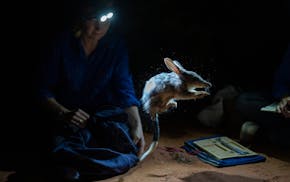A successful approach to treating post-traumatic stress in youngsters, developed at the Washburn Center for Children in Minneapolis, is being exported to Japan and China to support their developing foster care and mental health systems.
Psychologist David Hong will train therapists in both countries this year in trauma-focused cognitive behavioral therapy (CBT), an approach that helps children confront and manage the stress and anxiety associated with abuse or trauma in their lives.
"They have this biological alarm that just goes off inside of them — that fight-or-flight response" to trauma, Hong said. "The problem is sometimes the alarm stays on, even after the danger has passed. So basically what we do … is first we give kids skills to relax and turn off that alarm."
Hong said his work in China will represent the first time that the CBT approach to child trauma has been attempted in that country. Mental health therapy is still emerging as an accepted form of care in China, he said, much like acupuncture and alternative remedies remain on the fringe of American medicine and health insurance coverage.
Similarly, Japan is emerging from an institutional approach to sheltering abused children and moving to more of a foster care system — creating the need for more mental health providers who can work with those children in their communities. After training providers in both countries, Hong and other Washburn therapists will be available for consultation for several months.
Washburn's status as an international trainer has come in part from its early adoption of trauma-focused CBT, which is only one psychological philosophy but has fared well in comparative research studies in helping children manage stress and depression.
The center has been a leading provider of child therapy and school-based mental health services in Minnesota, but added a training center in 2014 after opening its Minneapolis headquarters. United Health Foundation has supported its mental health training through a $2.9 million grant.
Trauma-focused CBT is a structured approach, compared to open-ended talk therapy, that requires the involvement of parents or parent figures. Children complete drawings and other creations to express and confront the sources of trauma in their lives, and finally give a narrative presentation about their traumatic histories.
"This kind of climaxes in the end when kids tell their story. It's called the trauma narrative," Hong explained. "It's a huge achievement for them to have told it.
"If you avoid dealing with that topic, its always going to be painful for you."
Jeremy Olson • 612-673-7744

The Lyrid meteor shower peaks this weekend, but it may be hard to see it

Legislation that could force a TikTok ban revived as part of House foreign aid package
![Cattle at the Wysocki Dairy CAFO (concentrated animal feeding operation) in Armenia, Wisc. in late October. ] Aaron Lavinsky • aaron.lavinsky@s](https://arc.stimg.co/startribunemedia/GNUPD5JDUEDREIFU5RKJM2EV2Y.jpg?h=91&w=145&fit=crop&bg=999&crop=faces)
Iowa environmental groups ask EPA to step in and protect drinking water

Why you should donate clothing: It (probably) won't end up at the dump
